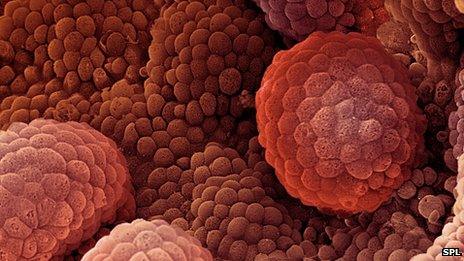Prostate cancer tests miss severity in half of cases
- Published

Scientists graded the men's cancer before and after surgery
Prostate cancer tests, which predict how aggressive a tumour is, underestimate disease severity in half of cases, scientists say.
In the , 209 out of the 415 who were initially told their cancer was slow-growing were found to have a more aggressive form of the disease.
And for almost a third of the 415 men, it had spread beyond the prostate.
Scientists are calling for better tests to define the nature of the cancer.
Study 'important' for British men
Prostate cancer is the most common male cancer in the UK. There are 41,700 new cases diagnosed and 10,800 deaths each year.
The prostate is a gland located between the bladder and the penis, just in front of the rectum.
For this study, scientists at the University of Cambridge graded the men's cancer before and after they had surgery, between 2007 and 2011.
Study author Greg Shaw, a urological surgeon at the University of Cambridge, said there were a "surprising" number of men who were not diagnosed appropriately the first time around.
He said the study was "very important" for British men as cohorts abroad were not always comparable to the type of prostate cancer in the UK.
At the moment, men with low-grade, early stage cancers are offered the choice of an operation, to remove the prostate, or active surveillance, where doctors perform regular blood tests and examinations.
Mr Shaw said if men opted for active surveillance, 30% of them would be likely to need "radical treatment", such as surgery and radiotherapy, five years later.
"This shows there is room for improvement," he said.
But he said there was potential for bias in the study, as there might have been a subtlety in the advice given to men in the clinic that hinted their cancer was more severe, which could have been why they opted for surgery.
So the study was not necessarily representative of those men who opted for active surveillance, he said.
'Informative' for NHS
Mr Shaw said a template biopsy, which looks at more tissue samples than the usual prostate biopsy, should be included.
Biopsies examine tissue removed from the body to see the extent of the disease. More samples may give a clearer picture of the extent of the disease.
He also said MRI scans should be improved to identify how aggressive the prostate cancer was from the outset.
Prof David Dearnaley, at the Institute of Cancer Research, London, said: "I think this is a very good and thoughtful study and I think it does inform what we should be doing in the NHS."
But he said the study had limitations as the definitions of "significant" cancer were uncertain.
Prof Dearnaley said targeted biopsies would be better than the random ones which are currently used.
Dr Iain Frame, director of research at Prostate Cancer UK said: "Accurate prostate cancer diagnosis continues to be one of the biggest challenges facing the disease today.
"The results of this study highlight yet again that existing tests cannot provide a precise picture of the aggressiveness of a man's cancer, often leaving men and their doctors to make difficult decisions about treatment without all the facts."
He said until tests improved, it was important men talked to their doctors about the pros and cons of each treatment.
- Published11 April 2014
- Published1 November 2013
- Published1 April 2011